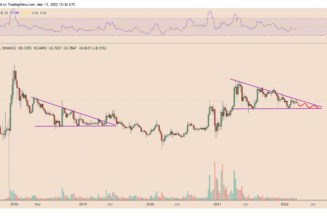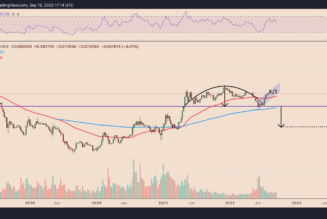
The China Banking Association, the China Internet Finance Association and the Securities Association of China issued a joint statement warning the public about the “hidden risks” of investing in nonfungible tokens, or NFTs.
In a Wednesday notice, the three associations launched initiatives aimed at encouraging innovation in the crypto and blockchain space focused on NFTs as well as “resolutely curb[ing] the tendency of NFT financialization and securitization” to reduce the risks around illicit activities. The China Banking Association said member institutions should not consider NFTs assets like securities, precious metals, and other financial products.
In addition, cryptocurrencies including Bitcoin (BTC), Ether (ETH) and Tether (USDT) should not be used for the pricing and settlement of NFT transactions, platforms should perform real-name authentication and follow Anti-Money Laundering requirements, and associations and firms in compliance should not invest in NFTs or provide financial support to others for doing so. Other measures in the proposed code of conduct included not providing centralized transactions and not weakening the tokens’ nonfungibility “by dividing ownership or batch creation, and carrying out token issuance financing in disguise.”
“We solemnly call on consumers to establish correct consumption concepts, enhance their awareness of self-protection, consciously resist NFT speculation and speculation, be vigilant and stay away from NFT-related illegal financial activities, and effectively safeguard their own property safety,” said the associations. “If relevant illegal activities are found, they should be reported to the relevant departments in a timely manner.”
The associations proposed:
– NFTs shouldn’t represent financial assets like bonds, insurance, or precious metals
– NFTs shouldn’t be used to facilitate #ICOs
– members of the associations shouldn’t provide centralized exchanges for NFTs
– NFTs cannot be transacted in crypto…— China Boring Tech (@ChinaBoringTech) April 13, 2022
China-based regulatory associations have previously issued warnings to the public about investments in cryptocurrencies while also calling on member institutions to abide by existing regulatory provisions regarding digital assets. The country officially banned crypto exchanges from providing services in 2017, but many individuals were able to use local bank accounts for crypto-related transactions before the People’s Bank of China started cracking down on the activity in 2021.
Related: China’s share in Bitcoin transactions declined 80% post crackdown: PBoC
Some of China’s social media websites, including WeChat, have removed NFT platforms in 2022 seemingly in anticipation of a government crackdown. However, Chinese multinational e-commerce firm Alibaba Group — one of the largest companies in the world with a $272 billion market capitalization, launched an NFT marketplace in August 2021 that allows users to sell tokens representing licenses to copyrights.
 [flexi-common-toolbar] [flexi-form class=”flexi_form_style” title=”Submit to Flexi” name=”my_form” ajax=”true”][flexi-form-tag type=”post_title” class=”fl-input” title=”Title” value=”” required=”true”][flexi-form-tag type=”category” title=”Select category”][flexi-form-tag type=”tag” title=”Insert tag”][flexi-form-tag type=”article” class=”fl-textarea” title=”Description” ][flexi-form-tag type=”file” title=”Select file” required=”true”][flexi-form-tag type=”submit” name=”submit” value=”Submit Now”] [/flexi-form]
[flexi-common-toolbar] [flexi-form class=”flexi_form_style” title=”Submit to Flexi” name=”my_form” ajax=”true”][flexi-form-tag type=”post_title” class=”fl-input” title=”Title” value=”” required=”true”][flexi-form-tag type=”category” title=”Select category”][flexi-form-tag type=”tag” title=”Insert tag”][flexi-form-tag type=”article” class=”fl-textarea” title=”Description” ][flexi-form-tag type=”file” title=”Select file” required=”true”][flexi-form-tag type=”submit” name=”submit” value=”Submit Now”] [/flexi-form]










Tagged: China, crypto blog, Crypto news, Law, NFT, Peoples Bank of China, Regulation, Tokens